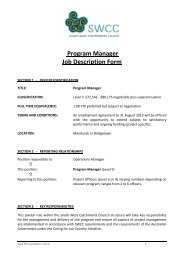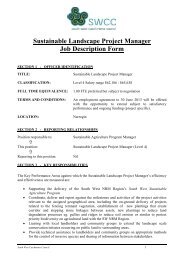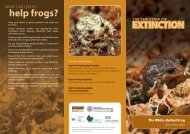Tender for the Programme - South West Catchments Council
Tender for the Programme - South West Catchments Council
Tender for the Programme - South West Catchments Council
You also want an ePaper? Increase the reach of your titles
YUMPU automatically turns print PDFs into web optimized ePapers that Google loves.
DRAFT<br />
<strong>South</strong> <strong>West</strong> Regional NRM Strategy – Ancillary Document<br />
Will proposed action make real difference: xx<br />
Likely private intervention if required: xx<br />
Likely public intervention if required: xx<br />
Identified threats: Dieback and o<strong>the</strong>r pathogens; lack of funds <strong>for</strong> management; climate change (in<br />
longer term); water extraction; weeds; feral animals (pigs, deer); land management practises; fire;<br />
plantations (weedy species & clearing); human use (linked to dieback); logging and mining.<br />
Comments: The chief value lies in <strong>the</strong> rarity (uniqueness) of <strong>the</strong> nor<strong>the</strong>rn Jarrah Forest ecosystem; also<br />
social and recreational values.<br />
5.6.1.18 Remnant vegetation managed by DEC<br />
Asset value: Exceptional<br />
Asset identifiable: Yes, but dispersed<br />
Will proposed action make real difference: xx<br />
Likely private intervention if required: xx<br />
Likely public intervention if required: xx<br />
Threat score: High<br />
SMART goal <strong>for</strong> actions: xx<br />
Identified threats: Dieback and o<strong>the</strong>r pathogens; waste (dumping); climate change (decreasing rainfall);<br />
introduced species; clearing; weeds; feral animals (rabbits, increasing numbers of kangaroos); urban<br />
development (increasing pressures of human use); degradation of vegetation; land management<br />
practises; bushfires; human use (motorbikes, 4WDs); lack of knowledge/awareness (“who cares”); limited<br />
funds.<br />
Comments: Very few are truly “managed” by DEC due to lack of funds (so not priorities); shire reserves<br />
generally better managed (in Serpentine and Waroona, less so in Harvey); biodiversity values as little left<br />
on coastal plain; tap into what people care <strong>for</strong> (orchids and warm & fuzzies).<br />
5.6.1.19 Remnant vegetation in well-managed shire reserves<br />
Asset value: Exceptional<br />
Asset identifiable: Yes, but dispersed<br />
Will proposed action make real difference: xx<br />
Likely private intervention if required: xx<br />
Likely public intervention if required: xx<br />
Threat score: Moderate<br />
SMART goal <strong>for</strong> actions: xx<br />
Identified threats: Dieback and o<strong>the</strong>r pathogens; pollution (rubbish – illegal dumping); climate change;<br />
introduced species; clearing; weeds; feral animals; urban development; clearing; degradation of<br />
vegetation; land management practises; fire management practises; bushfires; human use; lack of funds<br />
<strong>for</strong> environmental officers in some shires.<br />
Comments: Shires include Mandurah City, and Serpentine-Jarrahdale; environmental officers have a very<br />
focussed role; S-J is divesting itself of “lower” value reserves, only keeping those with DRF etc. (significant<br />
reserves are known, mapped) – S-J has decided to only keep “good” ones and get rid of everything else;<br />
o<strong>the</strong>r shire threats are magnified as little or no management; S-J has strong community groups (active as<br />
lobbyists); values include biodiversity.<br />
5.6.1.20 Remnant vegetation in not-so-well managed shire reserves<br />
Asset value: Exceptional<br />
Asset identifiable: Yes, but dispersed<br />
Will proposed action make real difference: xx<br />
Likely private intervention if required: xx<br />
Likely public intervention if required: xx<br />
Threat score: High<br />
SMART goal <strong>for</strong> actions: xx<br />
Identified threats: Dieback and o<strong>the</strong>r pathogens; pollution (rubbish – illegal dumping); climate change;<br />
introduced species; clearing; weeds; feral animals; urban development; clearing; degradation of<br />
vegetation; land management practises; fire management practises; bushfires; human use; lack of funds<br />
<strong>for</strong> environmental officers in some shires.<br />
153






